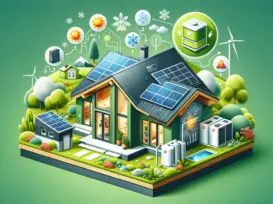Grus Home Energy - Enhanced Energy Efficiency
Unlocking Sustainable Future: Strategies for Amplified Energy Efficiency in Modern Society
Unlocking Sustainable Future: Strategies for Amplified Energy Efficiency in Modern Society
As the global population expands and the demand for energy skyrockets, the need for enhanced energy efficiency becomes not just a priority, but a necessity. Energy efficiency is the art of achieving the same level of service and production while using less energy. This is crucial in mitigating climate change, reducing energy costs, and conserving our planet’s precious resources. The push towards amplified energy efficiency is shaping modern societies, industries, and economies, creating a blueprint for a sustainable future.
One of the key strategies for improving energy efficiency is through the adoption of modern technology. Smart grids, for instance, optimize the delivery of electricity and reduce wastage by using digital communications technology to detect and react to local changes in usage. Furthermore, smart thermostats and energy-efficient appliances in homes and businesses can significantly cut down energy consumption. The Internet of Things (IoT) plays a pivotal role in this transformation, allowing devices to communicate and operate at peak efficiency, reducing unnecessary power usage.
Another significant area of focus is the construction and retrofitting of buildings. Green building standards, such as LEED and BREEAM, encourage the design and construction of energy-efficient structures. These buildings incorporate high-performance windows, insulation, and lighting, as well as energy-efficient heating, ventilation, and air conditioning (HVAC) systems. Retrofitting existing buildings with these technologies can also lead to substantial energy savings. For example, installing proper insulation and sealing leaks can prevent heat loss and reduce the need for heating and cooling, which is one of the largest energy expenses in buildings.
Transportation is another sector where energy efficiency can yield considerable benefits. The shift towards electric and hybrid vehicles, along with the development of more efficient public transportation networks, can dramatically reduce fossil fuel consumption. Additionally, the implementation of smart traffic management systems can minimize congestion and idling, thereby saving fuel and reducing emissions. Walking, cycling, and car-sharing are being promoted as not only healthy alternatives but also as energy-efficient transportation options.
Moreover, policy and regulation play a critical role in driving energy efficiency. Many governments across the world have set ambitious targets to reduce energy consumption and have implemented measures such as energy-saving standards for appliances and vehicles, subsidies for energy-efficient technologies, and penalties for excessive energy use. These policies have to be continuously updated to reflect the latest technological advancements and to keep pushing the boundaries of energy efficiency.
To support these strategies, education and behavioral change are essential. Individuals need to be aware of the role they play in energy consumption and the impact they can have through simple actions like turning off lights when not in use, using energy-efficient appliances, and reducing water waste. Education programs and public awareness campaigns can help to instill a culture of energy conservation in society.
Finally, the development and expansion of renewable energy sources such as solar, wind, and hydroelectric power are inseparable from the pursuit of heightened energy efficiency. By utilizing clean, sustainable energy and reducing reliance on fossil fuels, we can make a significant leap towards a more energy-efficient and environmentally friendly future.
In conclusion, enhanced energy efficiency is a multifaceted challenge that requires a holistic approach. Through technological innovation, sustainable building practices, efficient transportation, supportive policies, behavioral changes, and the growth of renewable energy, we can unlock the door to a sustainable future. The collective effort of individuals, businesses, and governments will drive the progress towards a more energy-efficient society, ensuring that we meet today’s needs without compromising the ability of future generations to meet theirs.
©2025 All Rights Reserved. Grus IoT Co.,Ltd.
